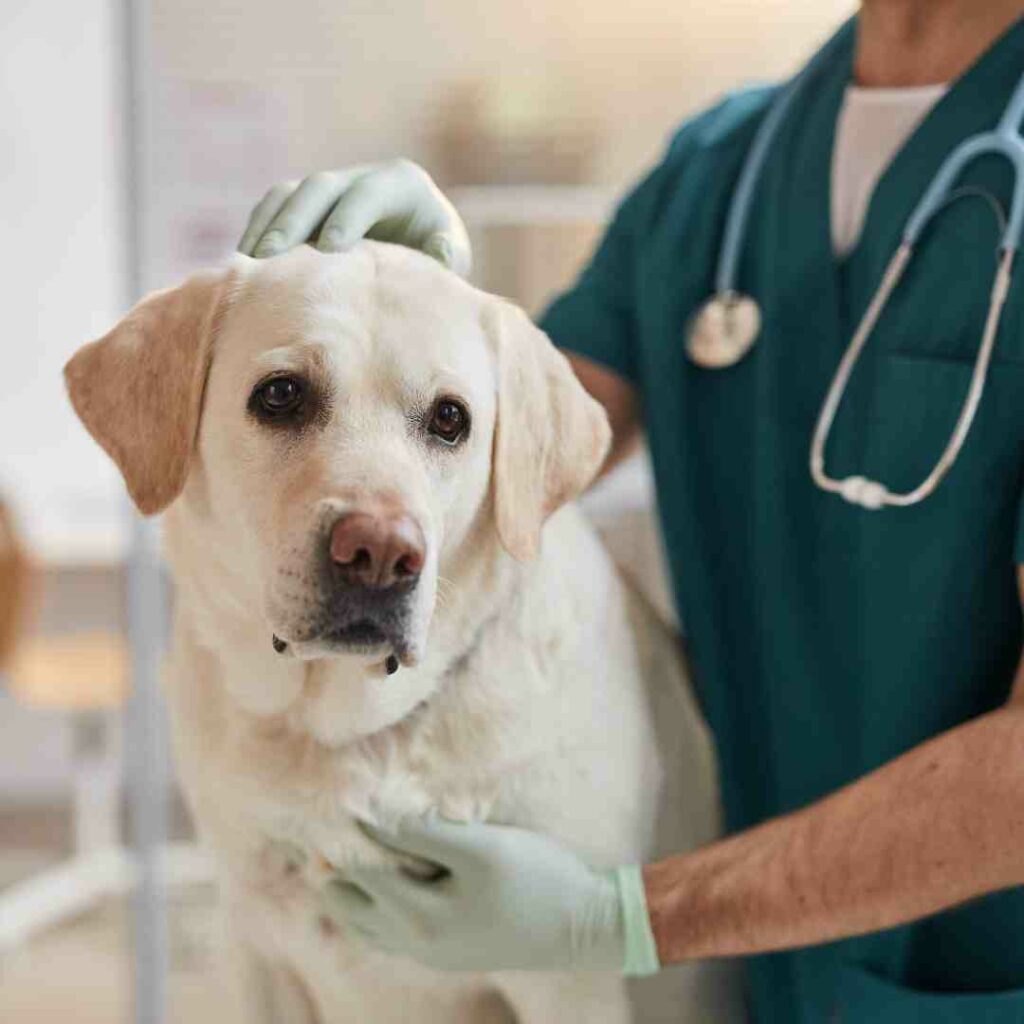Weight loss in dogs can be confusing and worrying. You might wonder why your dog is dropping pounds instead of staying steady. The reasons for dog weight loss range from simple diet changes to serious health issues. A visit to the vet might be necessary, especially if the weight loss is sudden and unclear (like when your dog isn’t acting like its usual self). With professional advice, you’ll be better able to handle and support your dog’s health.
Now, imagine you’re looking at your dog’s food bowl, noticing less food disappearing each day—what’s happening? Nutritional factors, like diet changes or trouble absorbing nutrients, could be causing it, but that’s just part of the story. Things like aging and different medical problems, such as dental issues or organ trouble, often lead to weight changes in dogs, too. Knowing when to step in and seek help (maybe thinking, “Is it time for another vet visit?”) is important for keeping your dog happy and healthy.
Key Takeaways
- Sudden or unexplained weight loss in dogs necessitates a veterinary check-up.
- Nutritional imbalances and various medical conditions can lead to weight loss.
- Early detection and appropriate management are key in supporting your dog’s health.
Common Medical Conditions Leading to Weight Loss
When your canine companion starts shedding pounds without any change in diet or exercise, it might indicate an underlying medical condition. This journey through potential causes isn’t just about identifying symptoms but also about empathizing with your furry friend’s health struggles.
Gastrointestinal Disorders
Gastrointestinal disorders can wreak havoc on your dog’s ability to absorb nutrients properly. Imagine (just for a moment) how it feels when you’ve got a stomach bug—no appetite, right? That’s how your dog might feel with conditions like inflammatory bowel disease or pancreatitis, which limit digestive enzymes and impair nutrient absorption.
Endocrine Diseases
Think of endocrine diseases like a silent saboteur quietly disrupting the intricate hormone balance within your dog’s body. Diabetes, for example, can lead to a glucose imbalance that might make your dog lose weight, even if they seem to be eating normally. It’s as tricky as trying to walk a tightrope in gusty winds.
Organ Diseases
Your dog’s organs are like an industrious team that suddenly loses a member—when the liver or kidneys face disease, such as kidney disease or liver disease, the whole system feels the blow. These conditions can reduce the appetite or interfere with the body’s use of nutrients, leading to that worrisome weight loss you might be noticing.
Infections and Parasitic Diseases
It’s a tiny, unseen world full of creatures like parasites and bacteria that can turn your dog’s life upside down. Diseases such as epi (exocrine pancreatic insufficiency), where the pancreas fails to produce enough digestive enzymes, or a persistent bacterial infection could be the culprits behind that unexpected weight drop.
Cancers and Tumors
The word cancer brings a chill to the heart, as it can be a stealthy cause behind weight loss. A tumor might be quietly competing for your dog’s energy resources or causing enough discomfort to put them off their food. Any sign of lethargy paired with weight loss is your cue to visit the vet.
In each case, the most critical first step is recognizing the issue and consulting your vet. As you ponder what’s happening inside your dog’s body, remember, these conditions are manageable with the right care, and you’re already on the path to helping your best friend simply by learning more.
Nutritional Factors and Diet

When considering what’s causing your dog to lose weight, you can’t overlook the impact of their diet on their overall health and energy levels. Here’s how specific dietary issues could be the culprits.
Inadequate Diet
An inadequate diet means your dog isn’t getting the necessary nutrients and calories to keep them energized. Imagine if you were eating meals lacking in vital nutrients; you’d feel pretty sluggish, right? The same goes for your pup. Feeding them food that doesn’t meet their energy needs or skimping on portions can lead to weight loss. Sometimes, what’s in their bowl just doesn’t add up to the essential nutrition they require.
Malabsorption Syndromes
Your dog could be eating well but still losing weight due to malabsorption syndromes where the pancreas may not be doing its job. If nutrients aren’t properly absorbed, it’s like pouring water into a sieve and expecting it to hold water (spoiler: it won’t happen). Chronic diarrhea or constipation can be symptoms of these conditions, as the body isn’t processing the nutrients efficiently, leading to wasted energy and, consequently, weight loss.
Eating Disorders
Yes, dogs can have eating disorders too, affecting their appetite and their relationship with food. If your dog is experiencing anorexia (not to be confused with the human eating disorder Anorexia Nervosa, but simply a lack of appetite), they’re not getting their daily energy from meals. It’s concerning, like watching your friend push food around their plate pretending to eat. It’s a serious issue and can stem from psychological factors or as a response to underlying conditions, such as diabetes. Their disinterest in food can lead to a decrease in nutrition and weight loss.
Each of these issues shows just how closely your dog’s weight is tied to their diet and the importance of proper nutrition. Ensure you’re feeding them a balanced diet and keeping an eye on their eating habits. If they’re dropping pounds, it could be a signal to dig deeper into these nutritional factors.
Age-Related Causes and Management
As dogs age, changes in their health and weight are not just common—they’re expected. Let’s explore how time can affect your furry companion’s physique and what you can do about it.
Health in Older Dogs
With age, older dogs can experience a decline in their body’s ability to function as efficiently as it once did. You might notice your dog losing weight due to conditions like dental problems, which can make eating a painful chore. This is surprisingly common, but thankfully, it’s also treatable. Your vet can help you get a clear picture and tackle issues ranging from tartar build-up to more serious oral health conditions that can impact your dog’s appetite and nutrition.
From the whisper of possible gum disease to the fear of something as serious as kidney disease or cancer, these health issues demand attention (and you’re just the perfect detective for the job). Regular vet visits become even more crucial as your dog grows older. Besides, catching these conditions early not only helps manage your dog’s weight but can also improve their overall quality of life.
Weight Management Strategies
Navigating weight management for your aging pet can feel like a tightrope walk. A balanced approach is what you’re aiming for, combining proper nutrition and the right amount of exercise tailored to their energy level. It’s true the days of frisbee-fetch marathons may be behind you both, but gentler activities like moderate walks can do wonders.
Customizing your older dog’s diet to their changing nutritional needs is key. If they’re not as keen on their kibble as they used to be, or if you’ve noticed a dip in enthusiasm when mealtime rolls around, consider diet adjustments that might be more appealing or easier to digest. It’s a game of trial and error sometimes, but with patience and observation, you’ll find what works. And let’s not forget water—it’s important to ensure they remain hydrated.
Remember, when it comes to managing your senior dog’s weight and health, the most powerful tool at your disposal is your love and commitment to their well-being. Thumb through those food labels carefully, schedule those vet visits diligently, and throw in as much belly rub time as possible. They’ve earned it.
Diagnostic Approaches and Treatments
When your dog begins to lose weight unexpectedly, it’s crucial to discover why. Your veterinarian will propose a series of tests to uncover the underlying causes and determine the best course of treatment.
Types of Tests Conducted
Your veterinarian will begin with a thorough physical examination; they’ll check for any signs of discomfort, examine your dog for physical abnormalities, and assess signs like lethargy or dehydration. Blood tests are a go-to diagnostic tool, offering insights into organ function (think: liver and kidneys) and the possible presence of infections or anemia. Urinalysis helps evaluate kidney health and can pick up diabetes or urinary tract infections (UTIs) that might be affecting your pet’s weight.
Depending on the initial findings, your vet might suggest more specialized tests, such as imaging (like X-rays or ultrasound), to observe internal organs. If a hormonal imbalance is suspected, especially in a neutered dog, endocrine testing could be on the table.
These tests can feel daunting, but remember, each one brings your furry friend closer to a tailored solution to regain their healthy, tail-wagging self.
Treatment Options
Once the diagnostic process pinpoints the problem, your veterinarian will outline treatment options specific to your dog’s condition. If it’s an infection, a round of antibiotics might be necessary. Should the tests reveal a more chronic condition, such as diabetes or a thyroid issue, a long-term management plan, including medications and dietary adjustments, will be key.
Sometimes, the fixes are simple: an upgrade to a more nutritious diet or deworming medications can make all the difference. In the case of more complex health issues, your vet may refer your dog to a specialist for advanced care.
Your role is to become an active participant in your dog’s treatment plan—observe their response to medications, monitor their weight, and don’t hesitate to reach out to your vet with any concerns (they’re there for both of you, after all). It’s all about teamwork, and with the right approach, your canine companion will be on the path to recovery.

Frequently Asked Questions
When your furry friend starts shedding pounds unexpectedly, it can be cause for concern. Let’s tackle some questions you might have about why this is happening.
Why is my dog losing weight despite having an appetite?
It’s perplexing (right?), but sometimes dogs lose weight even if they’re gobbling down their meals. This could be due to various reasons, including digestive issues where they aren’t absorbing nutrients properly, or even (under the radar) health problems like diabetes.
What should I do if my dog is suddenly losing weight?
First thing’s first—don’t panic (easier said than done). It’s essential to consult a vet to get to the root of the issue. They’ll likely suggest some dietary adjustments or investigate other potential causes like stress or anxiety impacting your dog’s weight.
What medical conditions can lead to a dog becoming underweight?
Various conditions can whittle down your pup’s weight; think parasites, such as worms, or chronic illnesses such as kidney disease or liver problems. Even hormonal imbalances, like hyperthyroidism, can be the sneaky culprit.
Can cancer be a reason for my dog’s rapid weight loss?
Unfortunately, yes. Cancer can lead to significant weight loss in dogs, be it through the energy-draining effects of the disease itself or the decreased appetite from discomfort and pain.
Why is my older dog losing weight but still eating well?
Aging brings changes, and sometimes it’s not for the better (I know, it’s a tough cookie to swallow). As dogs age, they could face conditions like dental problems that affect eating habits, or diseases more common in senior pups that influence overall health.
What tests should be considered for a dog experiencing unexplained weight loss?
Your vet will be your go-to for this. They might suggest blood tests, urine analysis, x-rays, or ultrasounds to peek into what’s going on internally. These can help pinpoint any underlying issues (fingers crossed) that could be causing weight loss.






